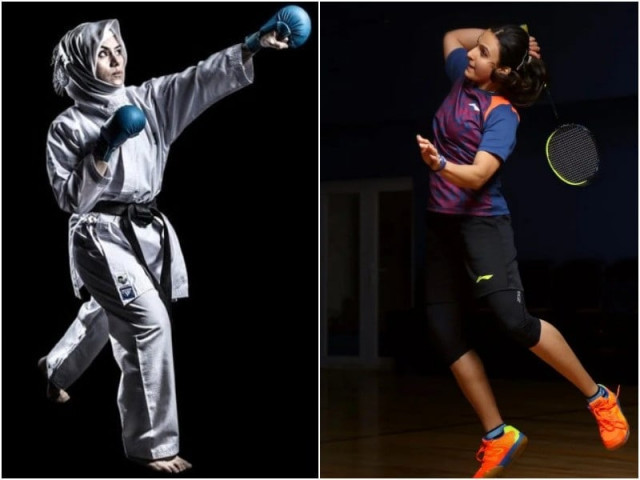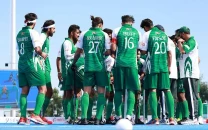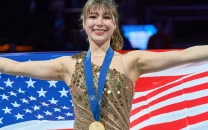Sportswomen’s stories of grit and grace
Pakistani athletes Kulsoom, Palwasha have broken down all barriers to prove their mettle on and off the field

Perseverance is not enough, neither is patience and not just hard work, because the two of the shining examples of women in sports in Pakistan that we see in Kulsoom Hazara and badminton player Palwasha Bashir speak of grit and grace.
What it means to have a female experience while being an athlete in Pakistan is to consistently fight adversity, and both women have proven their mettle on and off the field.
For International Women’s Day 2022, both Kulsoom and Palwasha’s comments may just mean more than others because of their sheer will keep the enthusiasm alive despite facing discrimination and social pressures.
For Kulsoom, her biggest challenge was just the fact that in her household there were no men. That meant having to hear all kinds of unsavoury attacks not only on her intentions to become an athlete but also making ends meet financially, as the country does not provide development programs for youth on any level.
She belongs to the persecuted community of Hazaras in Quetta and for her to lose her parents at a very young age, then to be adopted by her older sister Zehra and her husband Sarwar Ali, who taught Kulsoom karate but was killed in sectarian violence for their faith meant a multitude of hardships.
“I didn’t even have YouTube at the time, I was too young, and when my mentor, my teacher Ali was killed, I was very low, very young and I would keep training in my room. We came to Karachi to escape the persecution, but I have grown up in a household without a male in it, and that means we as women were never taken seriously and we had to struggle financially,” Kulsoom told The Express Tribune.
“I have seen the time when I had cut my very long hair. I was very young, but I understood that my sister was sewing clothes, doing embroidery and teaching at the same time to make ends meet. I thought to ease her financial burden I should cut my hair, because I would need to use too much shampoo for it.
“I did that because I understood the challenges of being a woman in this country, not having financial security either and the social stigma attached to working women. My sister broke into tears and she hugged me when she found out what I had done. So obviously pursuing sports and karate was more personal because I wanted to carry on what my brother-in-law had taught. I wanted to win medals, I wanted to make a mark. There came determination with all the severe circumstances I saw.”
Kulsoom went on to win eight medals at the South Asian Championships including three gold, three silver and two bronze medals. She then won a gold, silver and three bronze medals in the South Asian Games along with becoming a record 13 times national champion in a row.
She added that many a times, when she would go to train in the national coaching camps and live in hostels in other cities for karate training, people in her surrounding would criticise her and tell her sister to stop Kulsoom or else there will be no prospects of marriage for her.
“We had to listen to all kinds of things. People will point fingers at me for staying at the coaching facilities later, they would twist their words on why I’m coming late in the evening, there was a lot of negative comments and a lack of support or even acceptance. So I remember when I took that first gold medal at the South Asian Championships, I was crying because it was all coming back to me. We had survived,” said Kulsoom, who took the gold in -60kg event in India back in 2011 when Pakistan women made their international debut in karate.
Kulsoom feels happy that despite all kinds of constraints, social and financial, she managed to finish her studies and continue her career as a sportswoman too at the top of her field.
“I want to say to the girls that they should work hard and play a role in bringing betterment to the country, not just in sports but in any field and my message to the parents is that they should not stop their girls from achieving their dreams. They too can win accolades for the country. Marriage is not the only way to live life for women. They need to let their girls follow their dreams first,” said Kulsoom.
Palwasha echoes Kulsoom’s views when it comes to the challenges she saw in her playing career and as a young girl picking up sports for life.
“I feel one of the biggest challenges was that there weren’t many women participants to begin with. There was a lack of female participation on the national level,” said the South Asian Games medallist and seven-times women’s singles national champion.
“I come from a conservative family so there were always these issues on transportations, no safe places to pursue sports as the parents would generally be scared to leave their girls to train because there weren’t many women. I have seen that the lack of academies and the grass-roots development had been a constant issue, and it remains so for many, but more so when I was younger.
“I feel there was this mindset and the barrier. We could never play freely. We live in a male-dominated society. These are just a few major challenges among others that we constantly face.”
She urges women in her message to continue the hard work and not give up. The 10-time women’s doubles national champion and international player Palwasha wants women to be productive.
“My message for the girls and women is that they must do everything, follow their dreams wholeheartedly, be all-in and leave no stone unturned in going for their goals that they set. They should be able to have peace in their heart that they did everything they could to make their mark.”



















COMMENTS
Comments are moderated and generally will be posted if they are on-topic and not abusive.
For more information, please see our Comments FAQ